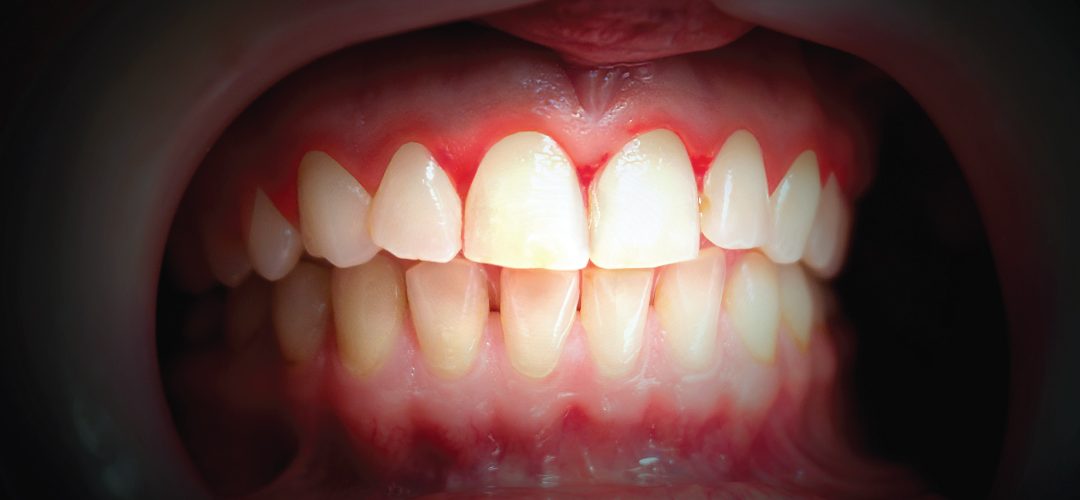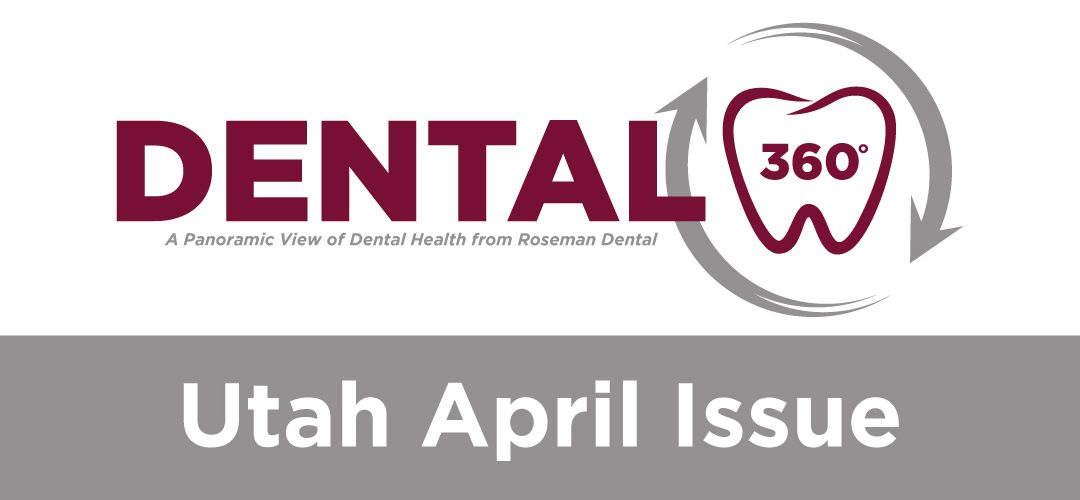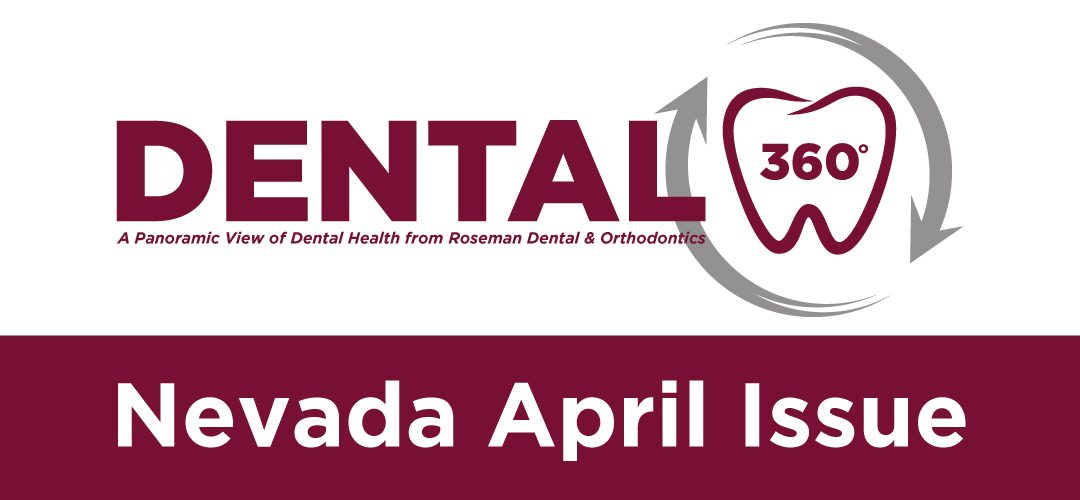
by Roseman Dental | Apr 26, 2021 | Dental 360, Dental Clinic Blog, Roseman Dental - NV, Roseman Dental - UT
Don’t panic if your gums are swollen. Surprisingly, it’s a common issue among people and in most cases, swollen gums are easily treated. Your gums are made of firm, pink, thick fibrous tissue full of blood vessels which cover your jawbone. Swollen gums, also known as gingival swelling, is when your gums are abnormally enlarged, bulging or protruding. When your gums are swollen it’s a sign they are irritated due to some type of issue and can be sensitive and painful.
Causes of Swollen Gums
There are several causes of swollen gums.
Gingivitis
Gingivitis is the most common cause of swollen gums. Gingivitis, also known as gum inflammation, is a form of gum disease that causes inflamed gums. The inflamed gums are due to plaque, a naturally occurring sticky film containing bacteria – also known as biofilm – that builds up on your teeth and produces toxins that irritate the gums. If you have gingivitis, your gums can be swollen, puffy, receding, sometimes tender, or bleed easily. Untreated gingivitis can develop into a more severe form of gum disease known as periodontitis, a major cause of tooth loss in adults.
Food Debris
If you notice swelling around just one tooth, it is possible there is food stuck under your gums. Make sure to floss and brush properly and the swelling should resolve in a few days? go away on its own. If the swelling persists, make sure to schedule an appointment with your dentist. Leaving food under your gums can lead to gum disease.
Pregnancy
During pregnancy there are a lot of hormonal changes that occur. These hormonal changes can cause swollen, inflamed and sensitive gums.
Abscessed Tooth
An abscessed tooth is a pocket of pus that’s caused by a bacterial infection. Your dentist will treat an abscessed tooth by draining the pocket of infection. Signs that you may have an abscessed tooth include not only red or swollen gums, but throbbing pain, swollen jaw or face, a tender or sore tooth, and fever. Make sure to schedule an appointment right away with your dentist if you are experiencing these symptoms.
Braces
Braces are designed to move and adjust teeth slowly over time. Braces cause a constant, steady pressure to your teeth that causes change to happen in your gums and jawbone. Having swollen gums is expected with braces, especially when they are first adhered or tightened. Braces with swollen gums is completely normal but brushing and flossing regularly will help reduce the amount of gum soreness you experience around your teeth. Having good oral hygiene while having braces will also help prevent gingivitis, the main cause of swollen gums. With braces it is a lot easier to get food stuck in the gums which can lead to gingivitis if proper oral hygiene isn’t practiced.
Additional Potential Causes
Other potential causes of swollen gums include:
- Poor Oral Hygiene
- Infection – Viral or Fungal
- Medication Side Effects
- Poor Nutrients
- Mouthwash or Toothpaste Sensitivity
- Dentures or Dental Appliances Fitting Poorly
Age, stress, obesity, tobacco, and genetics are also known to increase your risk of gum swelling.
Preventing Swollen Gums
The best thing you can do to prevent yourself from getting swollen gums is to practice good oral hygiene and visit your dentist on a regular basis – every six months for a cleaning and checkup. Good oral hygiene includes:
- Brushing your teeth at least twice a day at a 45-degree angle
- Brushing away from your gums to remove debris at or below your gumline
- Using a soft bristled toothbrush or an electric toothbrush – they’re more effective at removing plaque
- Cleaning between your teeth every day – flossers, interdental brushes or water flossers work well
- Using a mouthwash to help reduce accumulation of bacteria and plaque
If your swollen gums last for an extended period – more than a few days – or you are concerned about your gums, schedule an appointment with your dental provider. They will be able to diagnosis the problem and start treatment.
For affordable, high-quality dental care in Henderson, Nevada or South Jordan, Utah contact Roseman Dental.
Nevada Location
Utah Location

by Roseman Dental | Apr 12, 2021 | Dental 360, Dental Clinic Blog, Roseman Dental - UT
It’s a new month and Spring has finally arrived. The time has come where we can start enjoying the warmer weather, the beautiful flowers beginning to bloom, and the great outdoors. April is a month to be appreciative of the world around us, but it is also a time to bring awareness to Parkinson’s Disease and Oral Cancer. April is Parkinson’s Disease (PD) Awareness Month. PD is a nervous system disorder that affects movement. Approximately 60,000 Americans are diagnosed with PD each year and over 10 million people worldwide are living with it. Join Roseman Dental and the Parkinson’s Foundation this month to #KnowMorePD. This month is also Oral Cancer Awareness Month. Oral Cancer is cancer of the mouth and upper throat. Every hour, 24-hours-a-day, 365-days-a-year, someone dies of oral or oropharyngeal cancer. Yet, with early detection and treatment, Oral Cancer has high rates of survival. Make sure to get screened for Oral Cancer at your next dentist appointment.
During this month’s issue of Dental 360°, you’ll gain insight into how Parkinson’s Disease impacts dental health (link to article), a 360° look at Oral Cancer and gain a better understanding of tooth sensitivity and why you may have it (link to article).
Roseman Dental’s Dental 360° is a monthly e-newsletter. Each month you’ll receive a panoramic view of dental health. Dental health is key to your overall health and here at Roseman Dental, we are dedicated to improving not only your mouth, but your whole self. At our clinic we have an excellent team of licensed dentists, dental residents and students, and dental assistants and hygienists all focused on you and your family’s oral health. We offer comprehensive care, are a one stop shop for all your dental needs and offer dental care at a cost typically lower than what you would find at a traditional dental office. Roseman Dental has been serving its community since 2011 and we look forward to continuing to serve you and your family.
We hope you find Dental 360° helpful and informative. We look forward to connecting with you monthly.
Dental 360° April Articles
Parkinson’s Disease & Dental Health
Oral Cancer Awareness
Tooth Sensitivity & Why I Have It

by Roseman Dental | Apr 12, 2021 | Dental 360, Dental Clinic Blog, Roseman Dental - NV, Roseman Dental - UT
Do you ever feel pain when you consume certain foods or drinks that are hot, cold, sweet or acidic? You may be suffering from tooth sensitivity, also known as dentine hypersensitivity (DH) or dentine sensitivity (DS). Tooth sensitivity is defined as pain or discomfort in the teeth as a response to certain triggers or stimuli, such as hot or cold temperatures. Sensitivity occurs when tooth enamel is thinned.
Tooth Enamel
Tooth enamel is the visible, outermost covering of your teeth. The color of healthy enamel varies from light yellow to a gray or blue-like white. It’s the hardest substance in the human body and contains a high percentage of minerals. It protects the inner, more fragile areas of your teeth known as pulp and dentin. Taking care of your enamel is very important because it is the first line of defense against tooth sensitivity and tooth decay – the most common dental condition worldwide.
How Tooth Enamel is Worn Down
Tooth enamel can be worn down by brushing your teeth too hard, using a hard toothbrush, grinding your teeth at night – also known as sleep or nocturnal bruxism – and regularly eating or drinking acidic foods and beverages. It can also be worn down from repeated exposure to extreme temperatures.
Treating Tooth Sensitivity at Home
If you are experiencing tooth sensitivity, there are some things you can try that are considered over-the-counter dental treatments, but it is always important to consult with your dentist about your teeth sensitivity as they have the most knowledge and expertise in this area.
Desensitizing Toothpaste
Select a toothpaste that’s labeled as being specifically made for sensitive teeth. These types of toothpaste won’t have irritating ingredients. Some of these types of toothpastes also can contain desensitizing ingredients that can assist in blocking the discomfort from traveling to the nerve of the tooth. If you’re not sure what desensitizing toothpaste is right for you, consult with your dentist.
Alcohol-free Mouthwash
Mouthwash that does not contain alcohol will be less irritating to sensitive teeth.
Soft Toothbrushes & Brushing Softer
Tooth enamel can be worn down by brushing too hard and using a hard-bristled toothbrush. Try brushing softer and using a soft-bristled toothbrush or electric toothbrush.
Treating Tooth Sensitivity at the Dentist
If the at-home remedies just aren’t working, make sure to schedule an appointment with your dentist. There are a variety of things they can do to assist with tooth sensitivity.
Fluoride
Your dentist might apply fluoride to the sensitive areas of your teeth to strengthen tooth enamel and reduce pain. Your dentist might also suggest the use of prescription fluoride at home, applied via a custom tray.
Desensitizing or Bonding
Occasionally, exposed root surfaces can be treated by applying bonding resin to the sensitive root surfaces. A local anesthetic might be needed.
Surgical Gum Graft
Gum graft, also known as gingival graft, can be performed when your gums are receding. Gum recession exposes the roots of your teeth and can cause sensitivity and lead to tooth decay. If your tooth root has lost gum tissue, a small amount of gum tissue can be taken from elsewhere in your mouth and attached to the affected site. This can protect exposed roots and reduce sensitivity.
Root Canal
If your sensitive teeth cause severe pain and other treatments aren’t effective, your dentist might recommend a root canal — an endodontic treatment used to treat problems inside the tooth, known as the soft core or dental pulp. While this might seem like a significant treatment, it’s considered the most successful technique for eliminating tooth sensitivity.
If you’re experiencing teeth sensitivity schedule an appointment with Roseman Dental. Our skilled team will examine the affected teeth and recommend treatment to reduce your sensitivity.
Nevada Location
Utah Location

by Roseman Dental | Apr 12, 2021 | Dental 360, Dental Clinic Blog, Roseman Dental - NV
It’s a new month and Spring has finally arrived. The time has come where we can start enjoying the warmer weather, the beautiful flowers beginning to bloom, and the great outdoors. April is a month to be appreciative of the world around us, but it is also a time to bring awareness to Parkinson’s Disease and Oral Cancer. April is Parkinson’s Disease (PD) Awareness Month. PD is a nervous system disorder that affects movement. Approximately 60,000 Americans are diagnosed with PD each year and over 10 million people worldwide are living with it. Join Roseman Dental & Orthodontics and the Parkinson’s Foundation this month to #KnowMorePD. This month is also Oral Cancer Awareness Month. Oral Cancer is cancer of the mouth and upper throat. Every hour, 24-hours-a-day, 365-days-a-year, someone dies of oral or oropharyngeal cancer. Yet, with early detection and treatment, Oral Cancer has high rates of survival. Make sure to get screened for Oral Cancer at your next dentist appointment.
During this month’s issue of Dental 360°, you’ll gain insight into how Parkinson’s Disease impacts dental health, a 360° look at Oral Cancer and the spring discounts Roseman Dental is offering for orthodontic treatment.
Roseman Dental & Orthodontics’ Dental 360° is a monthly e-newsletter. Each month you’ll receive a panoramic view of dental health. Dental health is key to your overall health and here at Roseman Dental & Orthodontics, we are dedicated to improving not only your mouth, but your whole self. At our clinic we have an excellent team of licensed dentists, orthodontists, orthodontic residents – 30 to be exact, and dental residents all focused on you and your family’s oral health. Roseman Dental & Orthodontics has been serving its community since 2009 and is a comprehensive, one stop shop for all your dental needs including dental, orthodontic and craniofacial cleft lip & palate treatment.
We hope you find Dental 360° helpful and informative. We look forward to connecting with you monthly.
Dental 360° April Articles
Parkinson’s Disease & Dental Health
Oral Cancer Awareness
Spring into a Fresh Smile – New Orthodontic Discounts
Subscribe to e-newsletter




